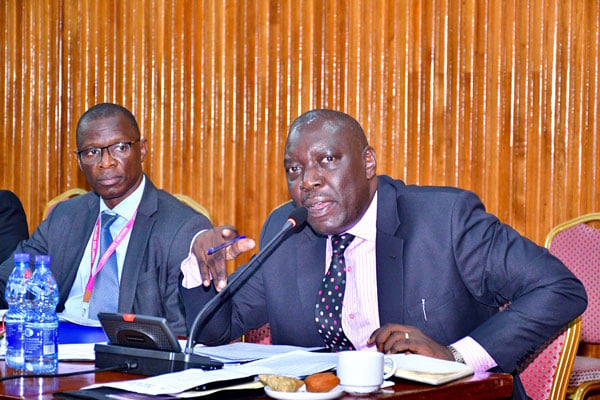Student loans: MPs question imbalance

Higher Education Students Financing Board executive director Michael Wanyama appears before Cosase at Parliament on May 3, 2023. PHOTO/DAVID LUBOWA
What you need to know:
Equity. The component of equity is missing here, and this for me is the biggest point. We agree that we need to give more money, but the little that has been given to you, some of us feel it has not been equitably distributed,” Ms Lucy Akello, vice chairperson of Cosase.
Parliament. Government officials had a tough task this week explaining to legislators on the Committee on Commissions, Statutory Authorities and State Enterprises (Cosase) why the list of students loans’ beneficiaries is largely dominated by recipients from one region.
Documents submitted to and pored over by Cosase compelled the lawmakers to task top management from the Higher Education Students Financing Board (HESFB) to explain why there is minimal representation from the regions of Karamoja, West Nile and Acholi. Western region dominated the list of recipients as captured by the 2021/2022 Auditor General Report.
“This list shows that Bushenyi, Busia, Isingiro, Kabale, Kasese,
Luweero, Mbarara, Mukono, Ntungamo, Runkigiri Sheema, Mitooma, [and] Tooro as those with the highest number of beneficiaries,” Mr Richard Gaffabusa (Buwamba County) noted, adding that the selection appeared not to consider regions that are “most vulnerable in terms of poverty.”
The Buwamba County lawmaker further noted that “there is no district in Karamoja that we all know to be the poorest region [in the country], no district in Acholi and West Nile and these are the regions that the country knows [to be poorest].”
Lawmakers, including committee vice chairperson Lucy Akello, were equally dismayed by the manner in which the funds are utilised by the HESFB.
“The component of equity is missing here, and this for me is the biggest point. We agree that we need to give more money, but the little that has been given to you, some of us feel it has not been equitably distributed,” Ms Akello noted.
Submissions made by the HESFB leadership indicated that the strong preference for students pursuing Science, Technologies, Engineering and Mathematics or Stem subjects could explain the imbalance.
Mr Gaffabusa shot back, reasoning, “If you look at the [Higher Education Students’ Financing] Act—the law that establishes this scheme—under section 20 on eligibility into the scheme, there is no where it is mentioned that it will be for people pursuing sciences. Where do you get that mandate? What if the most needy are the people in the humanities and yet you are giving to the scientist?”
In defence, Mr Michael Wanyama— the executive director of the HESFB—revealed that the awarding criteria is largely premised on the guidelines issued by President Museveni as well as the Third National Development Plan (NDPIII) and its predecessor—NDPII.
“Whatever we are also doing is based on His Excellency’s words. I should also mention NDPII and NDPIII that have also put focus and emphasis on sciences,” Mr Wanyama stated, adding, “Majority are doing sciences. We have not dropped arts [because] a few are doing humanities.”
Committee chairperson Joel Ssenyonyi, however, found Mr Wanyama’s non-convincing and demanded for detailed responses on the same to inform Cosase’s ruling on the matter.
While making reference to the documents from HESFB, Mr Ssenyonyi revealed that key among the aspects considered for someone to be considered include the economic activities undertaken by the applicant’s parents and or guardians, assets of applicants and social status of the applicant. He then ruled that basing on that scorecard, HESFB shoots itself “in the foot.”
The Law
Section 20 of the Higher Education Financing Act, 2004 states:
(1) The scheme is only for Ugandan students seeking financial assistance to pursue an accredited course of study or programme of higher education in an accredited institution of higher learning recognised by the National Council for Higher Education.
(2) In determining the eligibility into the scheme, the board shall
take into consideration the following:
(a) regional balance;
(b) gender;
(c) socio economic needs; and
(d) equity.
(3) The board may, by notice in the Gazette and a newspaper of
wide national coverage, declare the programmes or courses of study to be funded in a particular academic year.
(4) In determining the programmes or courses of study referred to in subsection (2), the Board shall take into account governmentpolicy regarding higher education.




